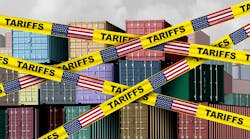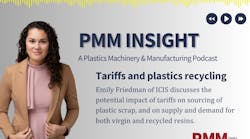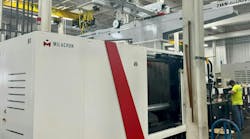By Lynne Sherwin
The Plastics Industry Association (PLASTICS) has issued a statement expressing concern about tariffs on Canada, Mexico and China ordered by the Trump administration.
“The plastics industry recognizes the importance of securing our borders and combating illegal drug trafficking to protect American communities. A strong and secure nation is fundamental to economic growth and industrial stability,” PLASTICS President and CEO Matt Seaholm said in the statement.
On Monday, hours before 25 percent tariffs were set to go into effect on goods from Mexico and Canada, last-minute talks between Trump and leaders of the other two nations led to a 30-day pause in imposition of the levies. Mexican President Claudia Sheinbaum won the reprieve after agreeing to send 10,000 troops to the U.S.-Mexico border in response to Trump’s concerns over illegal immigration and the flow of drugs, including fentanyl, into the U.S. Meanwhile, Canada, which announced its own 25 percent tariffs on $155 billion worth of U.S. imports, also offered to beef up security on the border.
Trade groups reacted to news of the potential U.S. tariffs with alarm.
“PLASTICS is concerned about the new tariffs and their impact on U.S. plastics manufacturing and jobs. While we understand President Trump’s rationale, a blanket tariff policy could have significant economic consequences, disrupting the movement of essential machines, products, and materials that keep American manufacturers running. A competitive industry requires policies that protect high-quality jobs and ensure stable supply chains across sectors like healthcare, consumer products, and automotive. A strategic, measured approach to trade is critical to strengthening — not inadvertently harming — U.S. industry.
“The plastics industry is a cornerstone of American manufacturing and daily life. We look forward to working with policymakers on balanced trade policies that enhance U.S. competitiveness, reinforce supply chains, and drive continued innovation,” Seaholm concluded.
The association said in the statement that in 2023, U.S. plastics exports totaled $74.2 billion, exceeding imports of $73.3 billion and resulting in a $958 million trade surplus.
PLASTICS warned that new tariffs on key trading partners could threaten supply chains, increase costs and risk eroding this advantage.
“To sustain growth and innovation, trade policies must bolster — not hinder — U.S. plastics manufacturing and economic leadership,” the statement said.
According to IndustryWeek, like PMM an Endeavor Business Media publication, Trump's proposed tariffs also drew fire from the National Association of Manufacturers, MEMA, the Vehicle Suppliers Association, the Consumer Brands Association and other organizations and analysts.
After Trump was elected, manufacturers of plastics machinery expressed conflicting views about whether tariffs would help or hurt. In recent years, several machinery OEMs have built manufacturing facilities in Mexico to shorten the supply chain and in hopes of avoiding tariffs.
Perc Pineda, chief economist for PLASTICS, pointed out in November that tariffs on equipment were relatively low at that time, 3.1 percent for most machinery, with exceptions for equipment imported from countries with free trade agreements, and for some types of manufacturing equipment, including injection molding machines (IMMs).
Trump declared the tariffs in an executive order Saturday, announcing across-the board 25 percent tariffs on imports from Mexico and Canada, and an additional 10 percent on imports from China. It does not mention any exceptions other than for “energy or energy resources” from Canada.
Pineda cautioned in November that across-the-board tariffs could be disruptive.
“If, in fact, we have tariffs that are very high and prohibitive, then we would have some short-term volatility in the market, if we can’t get the inputs to production. But if we’re serious about reviving domestic manufacturing, then I think the right trade policy would be to provide some carve-outs for those things that we need to make things here, and that includes all this equipment for plastics, some of which we don't make in the United States anymore, and some materials that go into it we don't make anymore.”










